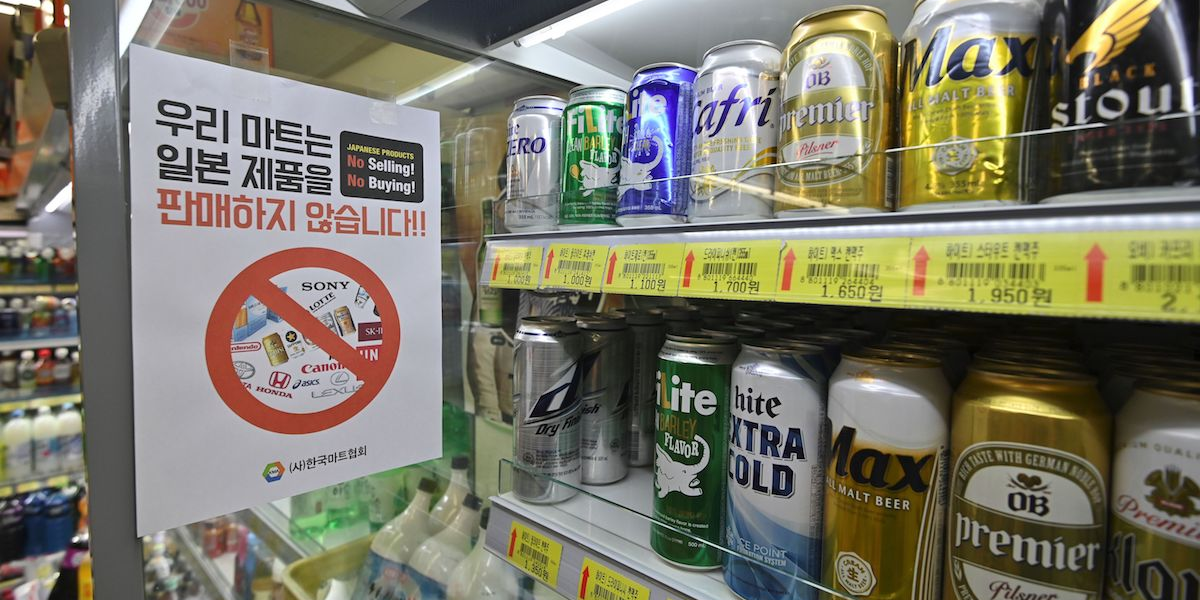- South Korea and Japan are in the middle of a deeply personal trade war, which has shown no signs of stopping.
- Tensions between the two countries go back over 100 years to 1910, when Japan occupied the Korean Peninsula and ruled it with an iron fist.
- Some South Koreans have been demonstrating weekly, boycotting Japanese goods, and canceling vacations to the country.
- Japan announced on Wednesday that it exported just $5,400 worth of beer to South Korea in September 2019, representing a 99.9% year-on-year decrease.
- Visit Business Insider’s homepage for more stories.
Beer exports from Japan to South Korea fell 99.9% year-on-year in September, the Japanese government said Wednesday, as the two countries’ trade war rages on with no end in sight.
Just 588,000 yen ($5,400) worth of Japanese beer was shipped to South Korea in September 2019, the Kyodo news agency reported, citing the country’s finance ministry.
This is a sharp decrease from the approximately 783.6 million yen ($7.2 million) worth of beer exports in September 2018, according to Channel News Asia.

South Koreans have boycotted various Japanese goods and services - from beer to clothing to vacations - amid the two countries' deeply personal trade war, which has seen both governments remove each other from their "white lists" of preferred trading partners.
The deep animosity between the two countries has reignited decades of mistrust between them, which began when Japan occupied the Korean Peninsula and ruled it with an iron fist from 1910 to 1945.
The current trade war was triggered by a South Korean Supreme Court ruling last year calling on Japanese companies to compensate Korean laborers during the occupation. Japan's government says it had already repaid all its wartime debts in a 1965 treaty.

The history of South Koreans' mistrust of Japan means the trade war has also taken a very personal turn.
Many businesses across South Korea have put up signs explicitly saying that they don't sell Japanese goods, and some have even banned Japanese people from entering.
Last month, South Korea's sports ministry asked the International Olympics Committee to ban Japan's "rising flag" from being displayed at the 2020 Tokyo Olympics - a request that has since been denied.
South Korean lawmakers have since described the flag as being akin to the Nazi swastika, The Guardian reported.
At least two people in South Korea also set themselves on fire this summer to protest the two countries' soured relations.

The trade war also stands to hurt South Korea's massive electronics industry.
Earlier this year, Japan placed export bans on three key high-tech materials - fluorinated polyimide, photoresists, and hydrogen fluoride - needed to make semiconductors and display screens.
Exports of hydrogen fluoride - the chemical used to clean semiconductors - from Japan to South Korea also fell 99.4% year-on-year to 3.72 million yen ($34,175) in September 2019, Kyodo reported, citing the finance ministry.
The South Korean government has since pledged to invest in the domestic supply of these raw materials.
- Read more:
- South Koreans are canceling vacations to Japan and boycotting its beer in a trade war more bitter than Trump's feud with China
- Japanese clothing giant Uniqlo pulled a TV ad in South Korea after viewers complained it mocked World War II sex slavery amid the 2 nations' escalating trade war
- South Korea kicked up its trade war with Japan by making it 3 times as hard for companies to export goods there
- South Korea ramps up trade war with Japan by ending intelligence-sharing pact, potentially stripping it of vital information about North Korea

